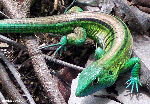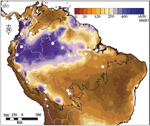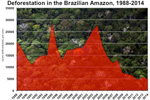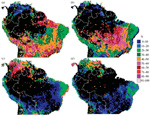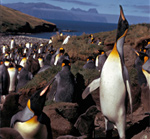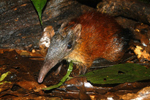FEATURED ARTICLES [Latest news updates]
An interview with Carly Waterman, Program Coordinator of EDGE
Saving forgotten species

|
|
(02/28/2008) In January 2007 a new conservation initiative arrived with an unusual level of media attention. The attention was due to the fact that the organization was doing things differently—very differently. Instead of focusing their efforts on the usual conservation-mascots like the panda or tiger, they introduced the public to long-ignored animals: photos of the impossibly unique aye-aye and a baby slender loris wrapped around a finger appeared in newsprint worldwide. The new initiative EDGE (Evolutionary Distinct and Globally Endangered), launched by the Zoological Society of London, was not concerned with an animal's perceived popularity, rather the chose their focal species on a combined measurement of a species' biological uniqueness and its vulnerability to extinction. Consequently, they hoped to make celebrities out of animals (big and small) most people had never heard of: the hairy-eared dwarf lemur, anyone?
A year of the EDGE program has brought a lot of successes and some disappointments, but certainly the public can no longer ignore nature's most unique animals. Carly Waterman, who has been involved in every part of EDGE as the program coordinator, spoke with Mongabay in February 2007 about EDGE's first year, its new amphibian program, and its future.
[
Endangered species | Conservation | Interviews]
An interview with remote sensing expert Josef Kellndorfer:
Complete map of world forests to help REDD carbon trading initiative

|
|
(02/28/2008) Policymakers, conservationists and scientists have high hopes that REDD, a mechanism for compensating countries for reducing emissions from deforestation and forest degradation, will spur a massive flow of funds to tropical countries, helping preserve rainforests and delivering economic benefits to impoverished rural communities. To date, one of the biggest hurdles for the initiative has been establishing a baseline for deforestation rates -- in order to compensate countries for "avoided deforestation" it first must be known how much forest the country has been losing on a historical basis. Until now, with some notable exceptions, this data was based largely on spotty satellite assessment and surveys of national forestry departments by the U.N. Food and Agricultural Organization.
[
REDD | Remote sensing | Deforestation]
Half the Amazon rainforest will be lost within 20 years
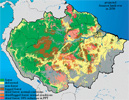
|
|
(02/27/2008) More than half the Amazon rainforest will be damaged or destroyed within 20 years if deforestation, forest fires, and climate trends continue apace, warns a study published in Philosophical Transactions of the Royal Society B. Reviewing recent trends in economic, ecological and climatic processes in Amazonia, Daniel Nepstad and colleagues forecast that 55 percent of Amazon forests will be "cleared, logged, damaged by drought, or burned" in the next 20 years. The damage will release 15-26 billion tons of carbon into the atmosphere, adding to a feedback cycle that will worsen both warming and forest degradation in the region. While the projections are bleak, the authors are hopeful that emerging trends could reduce the likelihood of a near-term die-back.
[
Amazon | Deforestation]
Rainforest logging threatens endangered sea turtles
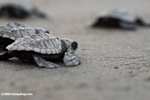
|
|
(02/25/2008) Logging is having an unexpected impact on endangered sea turtles in Central Africa, reports a new study published in Oryx. Aerial surveys in Gabon reveal that logs lost during transport are clogging beaches, preventing critically endangered leatherback turtles (Dermochelys coriacea) from nesting. The authors suggest that the impact of deforestation on sea turtles is only one example of the ties between degradation of land and sea ecosystems.
[
Gabon | Logging | Sea turtles]
Carbon traders, not conservationists, could save Cameroon rainforest
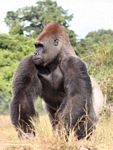
|
|
(02/15/2008) The government of Cameroon is looking to lease 830,000 hectares of biodiverse tropical forest to conservationists for an annual sum of $1.6 million. The problem? No conservation groups are interested. Apparently the asking price is too high, according to The Economist. Ngoyla-Mintom forest, as the concession is known, borders the Republic of Congo and serves as a corridor of habitat between three national parks in Cameroon, Gabon and Republic of Congo. Ngoyla-Mintom is home to forest creatures including elephants and gorillas. Without offers to meet its asking price, Cameroonian minister of forestry Joseph Matta says that he has little choice but to auction to the land to loggers.
[
Cameroon | Carbon finance | Conservation | REDD]
How activists and scientists saved a rainforest island from destruction for palm oil
(02/12/2008) In mid-January, Mongabay learned that the government of Papua New Guinea had changed its mind: it would no longer allow Vitroplant Ltd. to deforest 70% of Woodlark Island for palm oil plantations. This change came about after one hundred Woodlark Islanders (out of a population of 6,000) traveled to Alotau, the capital of Milne Bay Province, to deliver a protest letter to the local government; after several articles in Mongabay and Pacific Magazine highlighted the plight of the island; after Eco-Internet held a campaign in which approximately three thousand individuals worldwide sent nearly 50,000 letters to local officials; and after an article appeared in the London Telegraph stating that due to deforestation on New Britain Island and planned deforestation on Woodlark Island, Papua New Guinea had gone from being an eco-hero to an 'eco-zero'.
[
Papua New Guinea | Palm oil]
Nomadic Turkana face a troubled future in Northern Kenya

|
|
(02/04/2008) The Turkana people of northern Kenya, thrown into prominence by the war in neighboring Sudan, may be in danger of being forgotten again. Turkana is a dusty, wind-swept province in northern Kenya, where scorching temperatures are only occasionally punctuated by short, but life-sustaining bursts of rain. More than 300,000 Turkana, a nomadic tribe, make their home here. For hundreds of years they've received little or no attention beyond sporadic interest from missionaries and anthropologists—it was only the horrors of war across the border that brought outside awareness of their plight. Now, with hostilities in South Sudan diminishing and the U.N. winding down operations for Sudanese refugees, the Turkana may be left to themselves again—but without anyone adequately addressing the changes in their lives brought by the war.
[
Kenya | Featured]
China's wood industry fueled by illegal log imports from rainforest countries
(02/29/2008) While China has improved management of its forestry sector, expanding forest plantation cover and banning harvesting of natural forests, China's recent growth as wood-products exporter is built on timber imports — much of which are illegal — argues a researcher from the Smithsonian Tropical Research Institute in a letter to Science.
[
China | Logging]
3.7 billion tons of carbon released from deforestation in Riau, Sumatra
(02/28/2008) A WWF study found that deforestation of nearly 10.5 million acres of tropical forests and peat swamp in central Sumatra's Riau Province over the past 25 years has generated 3.7 gigatons of carbon dioxide.
[
Sumatra | Deforestation]
Small fires a big threat to Amazon rainforest biodiversity
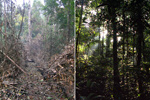
|
|
(02/27/2008) Small fires have a big impact in the Amazon rainforest, report researchers writing in Philosophical Transactions of the Royal Society B. The findings suggest a dire future for Earth's largest rainforest. Due to drying trends and fragmentation, surface fires are increasingly common in Amazon forests. Usually set by landowners clearing brush and vegetation, fires spread into surrounding forests areas, burning leaf litter and seedlings, especially during times of drought. The new research shows these knee-high fires cause significant changes in forest species composition.
[
Amazon | Forest fires]
A Doomsday Vault for Frogs?

|
|
(02/27/2008) The Amphibian Ark, a doomsday vault for amphibians, will highlight Leap Day, February 29th, to recognize 2008 as the Year of the Frog. The campaign seeks to raise awareness of the global plight of frogs and other amphibians threatened by habitat loss, climate change, pollution and an emergent disease. Joining in the effort is the Wildlife Conservation Society's (WCS) Bronx Zoo and New York Aquarium, facilities that house some of the world's most threatened amphibians.
[
Amphibians | Frogs]
Carbon trading could protect forests, reduce rural poverty

|
|
(02/26/2008) Carbon trading from avoided deforestation (REDD) credits could yield billions of dollars for tropical countries, according to analysis by mongabay.com. Using conservative estimates for carbon storage in tropical forests for 63 countries, mongabay.com estimates that reducing deforestation by 10 percent would generate $767 million to $4.6 billion per year at carbon prices ranging from $5-30 per ton of CO2 [tCO2e]. For comparison, the EU's ETS market for carbon credits is presently around $32/tCO2e. A 20 percent reduction would generate $1.5 to 9.2 billion, while a 50 percent reduction would yield $3.8 to 23 billion annually.
[
REDD | Carbon finance]
More people now live in cities than in rural areas
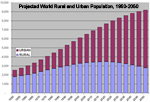
|
|
(02/27/2008) By the end of 2008, half of the world's 6.7 billion people will live in urban areas, according to a report released today by the United Nations. The 2007 Revision of World Urbanization Prospects provides the official UN estimates and projections of the urban, rural and city populations of all countries in the world up to 2050. The report predicts that future growth of the world's urban population will be concentrated in Asia and Africa.
[
Population]
Greenhouse gas emissions have already caused the Amazon to dry
(02/27/2008) Anthropogenic emissions of greenhouse gases have already caused the Amazon to dry, finds a new study published in Philosophical Transactions of the Royal Society B.
[
Amazon | Drought]
Web site offers homepage for every one of Earth's species
(02/27/2008) Monumental may be the only way to properly describe the Internet's Encyclopedia of Life. Its creators have set themselves the task of gathering accurate and detailed information on the earth's known 1.8 million species until every tree, arachnid, rodent, and even virus will have its own in-depth webpage. The site was initially launched in May 2007, but yesterday it unveiled the first 30,000 species pages (1/60th of the total recorded species), including 25 pages that are examples of what the site will include in the future: incorporating large amounts of information from numerous sources and varies multimedia like photo collections and videos. The project's goal is to have completed the initial 1.8 million recorded species by 2017.
[
Biodiversity | Technology]
Deforestation a greater threat to the Amazon than global warming
(02/26/2008) If past conditions are any indication of future conditions, the Amazon rainforest may survive considerable drying and warming caused by global warming, argue researchers in a paper published in Philosophical Transactions of the Royal Society B. Examining charcoal and fossil records from across the Amazon basin, Francis E. Mayle and Mitchell J. Power of the University of Edinburgh report that Amazon forests appear to have been "remarkably resilient to climatic conditions significantly drier than those of today, despite widespread evidence of forest burning" during the Early-Mid-Holocene, a period 4000 to 8000 years ago. The conclusion challenges other research suggesting that the Amazon is on the brink of a dramatic die-back due to the interaction of accelerating deforestation, increasing incidence and severity of forest fires, and the effects of climate change.
[
Amazon | Deforestation]
Reducing deforestation rates 10% could generate $13B in carbon trading under REDD
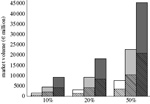
|
|
(02/25/2008) Cutting global deforestation rates 10 percent could generate up to $13.5 billion in carbon credits under a reducing emissions from deforestation ("REDD") initiative approved at the U.N. climate talks in Bali this past December, estimate researchers writing in Philosophical Transactions of the Royal Society B. But the researchers caution there are still substantial obstacles to overcome before carbon-credits-for-rainforest-conservation becomes a reality.
[
Amazon | REDD | Carbon finance | Brazil]
Aye-aye diverged from other lemurs 66M years ago
(02/25/2008) The aye-aye -- a bizarre, nocturnal lemur that taps on trees with its fingers to find its insect prey -- was the first of its family to branch off from the rest of the lemur line some 66 million years ago, report Duke researchers writing in the March 1 issue of Genome Research.
[
Madagascar | Lemurs]
Expedition finds inverted pyramid where sharks dominate marine ecology
(02/25/2008) A survey of a remote Pacific archipelago turned up pristine coral reefs that could offer a "baseline" for measuring the human impact on reefs worldwide, report researchers from the Scripps Institution of Oceanography (SIO) at the University of California at San Diego.
[
Oceans | Coral reefs]
Rats decimating Aleutian Islands' ecology
(02/25/2008) Rats are disrupting fragile ecosystems on the Aleutian Islands Archipelago, reports a new study published in the Proceedings of the National Academy of Sciences.
[
Invasive species]
Deep-sea krill discovered in Antarctica
(02/25/2008) Antarctic krill have been found living at depths up to 3000 meters (10,000 feet) near the Antarctic Peninsula, a finding that changes scientists' understanding of a fundamental part of the ocean food chain. Previously researchers believed that krill lived only in the upper ocean.
[
Antarctica | Oceans]
Amazon rainfall linked to Atlantic Ocean temperature
(02/25/2008) Climate models increasingly forecast a dire future for the Amazon rainforest. These projections are partly based on recent research that has linked drought in the Amazon to sea surface temperatures in the tropical Atlantic. As the tropical Atlantic warms, the southern Amazon -- the agricultural heartland of Brazil -- may see higher temperatures and less rainfall.
[
Amazon]
The future of Easter Island
(02/25/2008) Today the saga that is Easter Island's past is well known. The tragic circumstances that led to the downfall of its early civilization through starvation and war are of epic proportions. Many scientists agree that the real life scenario born from this isolated island serves as a warning, about the interrelatedness between scarcity of natural resources and conflict, for all mankind. However, current natural resource practices suggest that this lesson has fallen on deaf ears.
[
Erosion | Easter Island]
Amazon research and conservation cannot ignore social issues
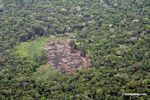
|
|
(02/25/2008) For Amazonian conservation to be effective it must start paying more attention to social issues according to a new paper: Taking things public: a contribution to address human dimensions of environmental change. The paper's author, Dr. Diogenes Alves, of the National Institute for Space Research told mongabay.com that "the main point of this paper is that it became crucial to recognize the social, economic and political settings associated with environmental change in the Amazon."
[
Amazon | Conservation | Deforestation | Brazil]
Widespread butterflyfish may go extinct due to global warming, pollution
(02/25/2008) The Chevroned Butterflyfish, a colorful fish found in tropical oceans around the world, faces extinction due to overexploitation, pollution and climate change, report researchers writing in the journal Behavioural Ecology and Sociobiology. Despite its widespread distribution, the species could be doomed by its specialized feeding habitats: the Chevroned Butterflyfish (Chaetodon trifascialis) feeds on only one type of coral.
[
Coral reefs | Fish | Oceans]
Brazil's ecosystem payments system offers clues for REDD implementation
(02/25/2008) Brazil's existing system for environmental services payments could offer insight for implementing carbon-credits-for-forest-conservation (REDD) initiatives in the Amazon rainforest, argues a London School of Economics researcher in a new paper published in Philosophical Transactions of the Royal Society B. Reviewing the performance of Brazil's Programme for the Socio-Environmental Development of Rural Family Production (Proambiente), Anthony Hall writes that "despite being fraught with problems, Proambiente is one tool among many which could reward small producers for enhancing carbon sequestration and biodiversity conservation."
[
Amazon | REDD | Carbon finance | Brazil]
Brazil seeks $1B/yr in donations to save the Amazon
(02/23/2008) Brazil will establish a donation-based fund to help finance conservation in the Amazon, according to Bloomberg. The announcement comes after deforestation rates spiked during the last five months of 2007.
[
Deforestation | Brazil]
Cyclone batters Madagascar
(02/23/2008) 29 people were reported dead after Cyclone Ivan, a category 3 storm, struck Madagascar. The storm flooded key rice-producing regions in the country and comes a month after Cyclone Fame killed 13 on the island.
[
Madagascar | Hurricanes]
Update to the kids' site
(02/23/2008) I've added three new pages on the rainforest site for kids: biofuels, soy, and palm oil.
[
Kids' site]
Is Guyana's logging deal in its best interests?
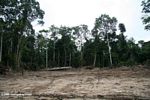
|
|
(02/22/2008) In January Guyana awarded U.S. timber firm Simon & Shock International a 400,000-hectare (988,400-acre) logging concession near the Brazilian border. Final approval hinges on the completion of an environmental impact survey and a tree inventory. While Simon & Shock International says it plans to conduct selective logging, the firm has not announced whether it will seek Forest Stewardship Council certification, a mark for responsibly-harvested timber. Is there an alternative that can improve the lot for the average Guyanese? There may be. Last fall Guyana's President, Bharrat Jagdeo, hinted at the potential of using the country's forests as a giant carbon offset to counter climate change
[
Guyana | Logging | Carbon finance | REDD]
Deforestation, wildlife conflict will be the source of emerging diseases
(02/22/2008) Due to habitat destruction and human-wildlife conflict, the tropics will likely be the next hotspot for emerging infectious diseases, report researchers who have developed the first map of new pathogens.
[
Deforestation | Disease | Health]
Arizona seeks to become the 'Persian Gulf' of solar energy
(02/22/2008) With a Spanish company's plans to dramatically expand solar capacity in the desert southwest of Phoenix, Arizona Governor Janet Napolitano said Arizona could become the "Persian Gulf of solar energy," according to the Associated Press.
[
Energy | Solar power]
Amazon state launches Zero Extinction Program for endangered species
(02/22/2008) The Brazilian state of Para has launched the Zero Extinction Program, an initiative to prevent threatened species from going extinct by protecting their habitats.
[
Amazon | Brazil | Conservation | Endangered species]
Restoring soil carbon can reverse global warming, desertification and biodiversity loss

|
|
(02/21/2008) Restoring the ability of soil to store carbon by promoting native grasses and vegetation can help reverse global warming, desertification and biodiversity loss, says an Australian researcher. Land use change — including deforestation, bush fires, and soil degradation — accounts for roughly 20 percent of global greenhouse gas emissions, but land management practices can be used to reduce emissions. While reforestation and avoided deforestation have garnered a lot of attention of late, restoration of other forms of vegetation can dramatically increase the capacity of degraded landscapes to store carbon.
[
Agriculture | Carbon sequestration | Global warming mitigation]
Large-scale Amazon deforestation or drying would have dire global consequences
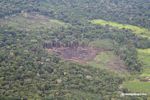
|
|
(02/21/2008) A new study shows that large-scale degradation of the Amazon, either through drying or continued deforestation, would have global consequence, including worsening climate change, causing regional vegetation shifts, and increasing dust in the atmosphere.
[
Amazon | Rainforests | Impact of climate change]
Private sector pumping hundreds of billions into cleantech
(02/21/2008) The private sector is "pumping hundreds of billions of dollars" into cleaner and renewable energies, says a new publication released yesterday by the United Nations Environment Programme (UNEP).
[
Energy | Cleantech]
Caterpillar transforms from mimicking bird droppings to a leaf
(02/21/2008) Scientists have discovered the hormone that enables swallowtail caterpillars to morph from mimicking bird droppings to the bright color form that matches the leaves upon which they feed. The research is published in Science.
[
Animal behavior | Insects]
Melting of permafrost could trigger rapid global warming warns UN
(02/21/2008) Warming air temperatures are causing Greenland's ice sheet to melt faster than previously anticipated, reported NASA on Wednesday. Though unlikely, the complete melting of Greenland's ice sheet would raise global sea level by 23 feet.
[
Climate change | Greenland-Arctic]
Melting of permafrost could trigger rapid global warming warns UN
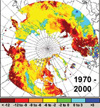
|
|
(02/21/2008) Melting of the Arctic permafrost is a "wild card" that could dramatically worsen global warming by releasing massive amounts of greenhouse gases, warned the U.N. on Wednesday at a meeting in Monaco. Vast amounts of methane, a greenhouse gas 23-25 times more potent than carbon dioxide, are locked in the deep sea and in the frozen soils of Siberia, Northern Europe, and North America, but warming could trigger rapid thawing that would release billions of tons into the atmosphere.
[
Greenhouse gases | Greenland-Arctic]
Ocean warming - not el Nino - drove severe Amazon drought in 2005
(02/21/2008) One of the worst droughts on record in the Amazon was caused by high temperatures in the Atlantic rather than el Nino, according to analyses of climatic and hydrological records. The research, published in Philosophical Transactions of the Royal Society B, suggests that human-driven warming is already affecting the climate of Earth's largest rainforest. In 2005 the Amazon experienced the worst in memory. As rivers dried up, remote communities were isolated while commerce slowed to a standstill. Thousands of square kilometers of land burned for months on end, releasing more than 100 million metric tons of carbon into the atmosphere
[
Agriculture | Biofuels]
World fertilizer prices surge 200% in 2007, hurting the poor
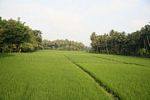
|
|
(02/20/2008) World fertilizer prices surged by more than 200 percent in 2007, as farmers sought to maximize corn production for ethanol, according to the International Center for Soil Fertility and Agricultural Development (IFDC). Poor African farmers were hardest hit by the increase. IFDC says the rise in fertilizer prices is fueled by new demand for grain for biofuel production, higher energy and freight prices, increased demand for grain-fed meat in emerging markets, and increased use of natural gas as liquefied natural gas (LNG).
[
Agriculture | Biofuels]
Ancient Amazon fires linked to human populations
(02/20/2008) European contact resulted in both a steep decline in indigenous populations and burning in the Amazon rainforest — at least until now. Analysis of soil charcoal in South America confirms that from a historical perspective, fire is rare in the Amazon rainforest, but when it does occur, it appears linked to human activities. The research, published in Philosophical Transactions of the Royal Society B, is based on dating of soil carbon, which provides a good indication of when fires occurred in Amazonia, according to lead author Mark Bush, head of the Department of Biology at Florida Institute of Technology.
[
Amazon | Forest fires | Indigenous people]
Conservation strategies can mitigate the impact of global warming in the Amazon
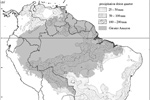
|
|
(02/20/2008) Communicating the impact of climate change to small farmers in the Amazon will be key in helping them adapt to higher temperatures, more frequent and intense drought, and greater incidence of forest fires forecast for the region, according to a paper published in Philosophical Transactions of the Royal Society B.
[
Amazon | Brazil | Conservation | Impact of climate change]
Amazon riparian zones need to be expanded to protect wildlife finds study
(02/20/2008) Strips of forest mandated by Brazilian law along rivers and streams in the Amazon rainforest are too narrow to effectively safeguard biodiversity, reports new research published in the journal Conservation Biology.
[
Amazon | Brazil | Fragmentation]
Small Amazon farmers especially vulnerable to climate change

|
|
(02/19/2008) Communicating the impact of climate change to small farmers in the Amazon will be key in helping them adapt to higher temperatures, more frequent and intense drought, and greater incidence of forest fires forecast for the region, according to a paper published in Philosophical Transactions of the Royal Society B.
[
Amazon | Brazil | Impact of climate change]
Fire policy is key to reducing the impact of drought on the Amazon
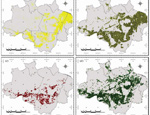
|
|
(02/19/2008) Gaining control over the setting of fires for land-clearing in the Amazon is key to reducing deforestation and the impact of severe drought on the region's forests, write researchers in a paper published in Philosophical Transactions of the Royal Society B.
[
Amazon | Deforestation | Drought | Forest fires | Impact of climate change]
Mongabay.com officially launches in Spanish
(02/19/2008) While the Spanish-language version of mongabay.com has been available for about a year, changes over the past two months have resulted in a significant expansion of the content found on the site. The new Spanish site offers weekly updates of conservation and environmental science news, tropical rainforest information, and resources for children.
[
es.mongabay.com]
Amid accusations of bribery by loggers, Borneo chief's remains to be exhumed

|
|
(02/19/2008) Police have announced that they plan to exhume the body of Kelesau Naan to discover his cause of death. The Penan chieftain and passionate activist against logging disappeared in October while checking animal traps. His body was found on December 12th of last year. Several bones were broken, leading some to believe that Naan was assassinated because of his long campaign against loggers — Naan had been one of the key figures in the Penan community's fight against logging. He was also a plaintiff and witness in a land rights claim that has been awaiting trial since 1998.
[
Borneo]
Planktos kills iron fertilization project due to environmental opposition

|
|
(02/19/2008) Planktos, a California-based firm that planned a controversial iron-fertilization scheme in an attempt to qualify carbon offsets, announced that it failed to find sufficient funding for its efforts and would postpone its project indefinitely. The announcement came as welcome news to environmentalists who feared the plan would be damaging to marine life. Planktos had planned to dump tons of iron dust in waters near the Galapagos islands.
[
Geoengineering | Oceans]
Educational character, Mongy the Frog, leaps into action
(02/18/2008) The rainforest site for children has a new character to help kids learn about wildlife and the environment: Mongy the Frog. Scripted by Christa Maas and inspired by the red-eyed tree frog, a species found in the tropical forests of Central America, Mongy will take kids on adventures to rainforests around the world. Mongy will initially be available in English and Portuguese but look for German and Spanish versions in coming months.
[
Rainforest information for kids]
10-pound 'Giant Frog From Hell' discovered in Madagascar
(02/18/2008) Researchers have discovered the remains of what may be the largest frog ever to exist. Working in Madagascar, scientists led by Stony Brook University paleontologist Dr. David Krause found the remains of a 16-inch, 10-pound frog that lived some 65 to 70 million years ago. The frog, known as Beelzebufo or devil frog, was so large and powerfully built, it may have eaten baby dinosaurs.
[
Fossils]
Gecko-inspired adhesive tape could improve recovery from surgery

|
|
(02/18/2008) Researchers are close to developing a biodegradable surgical adhesive based on biomimicry of gecko feet. Geckos are famous for their ability to walk on ceilings and vertical surfaces. The "gecko-inspired, nanopatterned" adhesive tape could supplement or replace sutures and staples in surgery. Unlike previous gecko-inspired adhesive tape, the new material will work in wet conditions and could be doped with biochemicals to accelerate healing. The adhesive would dissolve after an injury heals.
[
Biomimicry]
Tuna may go the way of cod: a collapsed fishery
(02/18/2008) The collapse of the cod fishery could provide important lessons to prevent a similar fate for some tuna populations, say researchers presenting at the American Association for the Advancement of Science (AAAS) Annual Meeting in Boston on February 18.
[
Fishing | Oceans]
How will global warming affect marine food chains?
(02/18/2008) Rising temperatures and acidity of the world's oceans due to human emissions of carbon dioxide is putting marine food webs at risk warned a researcher speaking at a press briefing at the annual meeting of the American Association for the Advancement of Science in Boston.
[
Fishing | Oceans]
Why are oceans at risk from global warming?
(02/18/2008) Climate change is putting the world's oceans at risk by increasing the temperature and acidity of seawater, and altering atmospheric and oceanic circulation, warned a panel of scientists this week at the American Association for the Advancement of Science (AAAS) annual meeting in Boston.
[
Fishing | Oceans]
Mysteries of the Great White Shark unveiled
(02/17/2008) The Great White Shark has always been a creature of mystery. The world's largest shark has long fascinated humanity from the novel and film Jaws to recent sumptuous footage of the sharks catching sea lions in Planet Earth. The behemoth, who at times can reach seven meters in length, has also become famous for occasionally attacking swimmers and surfers, though scientists believe the sharks do not intentionally hunt humans. However, the great predator's behavior and lifecycle remains mostly mysterious to science. Some of these mysteries are just now being unraveled thanks to the Tagging of Pacific Predators (TOPP) program.
[
Sharks | Oceans]
Nike to launch "green" eco-shoe
(02/15/2008) When Nike unveils the $185 Air Jordan XX3 this weekend at the NBA All-Star Game festivities this weekend, it will be the culmination of a company-wide effort to reduce the environmental impact of its footwear manufacturing, according to The Wall Street Journal.
[
Green marketing | Green design]
Warming could bring sharks to Antarctica with devastating ecological consequences
(02/15/2008) Global warming could make the waters around Antarctica hospitable to sharks for the first time in 40 million years. Their return could have devastating ecological consequences report researchers from the University of Rhode Island.
[
Oceans | Oceans | Sharks]
Prince Charles says protecting forests vital against climate change 'doomsday clock'
(02/15/2008) Long-time environmental activist, Prince Charles delivered an impassioned speech yesterday to the European Parliament on global warming and the importance of rainforest conservation in mitigating the crises. In stark terms he warned the Parliament of the grave danger of climate change. "For me, the crux of the problem is - and I only pray I will be proven wrong - that the doomsday clock of climate change is ticking ever faster towards midnight."
[
Rainforests]
Stabilizing climate requires cutting emissions to zero
(02/14/2008) Even if greenhouse gas emissions are reduced to zero tomorrow, global temperatures would remain high for at least 500 years, according to a new study published in Geophysical Research Letters. The findings suggest that stabilizing emissions at current levels will not be enough to curtail the effects of climate change.
[
Climate change]
Only 4% of the ocean is pristine according to first oceanic map of human-impact

|
|
(02/14/2008) There is a much used adage regarding the ocean that goes something like this: we know more about our solar system than our ocean. Whether or not one believes this to be true (less than 5% of the ocean has been explored), a group of over twenty researchers, by agglomerating the available information on the oceans, have created a large-scale image of the ocean's health. Compiling massive amounts of data from professional literature and research on marine ecosystems, the researchers created the first map displaying the extent of human impact on marine ecosystems.
[
Oceans]
UN: biofuels are starving the poor by driving up food prices
(02/14/2008) Echoing sentiments increasingly expressed by politicians, scientists, and advocates for the poor, the U.N. Food and Agriculture Organization warned that the world's poorest people are suffering as a result of the push to use food crops for biofuel production.
[
Biofuels]
Jack rabbits vanish from Yellowstone, ecologists puzzled
Scientists are puzzled over the apparent disappearance of jack rabbits from Grand Teton and Yellowstone National Parks, but say the local extinction may be having region-wide impacts on a variety of other prey species and their predators, according to a new study by the Bronx Zoo-based Wildlife Conservation Society.
[
Ecology]
$1 trillion carbon market in the U.S. by 2020 says study
The U.S. carbon emission trading market will top $1 trillion by 2020 if policymakers continue on their current path towards a comprehensive "cap-and-trade" program, estimates an analysis released at climate roundtable discussions at the UN General Assembly in New York.
[
Carbon trading]
World's largest marine protected area established in the South Pacific
Scientists are puzzled over the apparent disappearance of jack rabbits from Grand Teton and Yellowstone National Parks, but say the local extinction may be having region-wide impacts on a variety of other prey species and their predators, according to a new study by the Bronx Zoo-based Wildlife Conservation Society.
[
Oceans]
Fatal shark attacks hit a 20-year low in 2007
(02/13/2008) Human deaths from shark attacks hit a 20-year low in 2007 according to statistics released by the University of Florida.
[
Sumatra | Tigers]
Malaysia announces $103B development plan for Borneo island
(02/13/2008) Malaysia announced a $103 billion development plan for Sarawak, a state in northern Borneo.
[
Borneo | Palm oil]
5,000 mile-long tiger corridor proposed
(02/13/2008) The Wildlife Conservation Society and the Panthera Foundation announced plans to establish a 5,000 mile-long "genetic corridor" from Bhutan to Burma that would span eight countries and allow tiger populations to roam freely across the largest remaining block of tiger habitat.
[
Conservation | Tigers]
Sumatran tiger faces extinction due to wildlife trade
(02/13/2008) The critically endangered Sumatran Tiger faces extinction due to the tiger parts trade in Indonesia, reports a new report from TRAFFIC, the wildlife trade monitoring network run by IUCN and WWF.
[
Sumatra | Tigers]
First photos of face-to-face mating by gorillas in the wild
(02/12/2008) Scientists have taken the first photos of face-to-face copulation by wild gorillas. The images were captured in Nouabale-Ndoki National Park in the Republic of Congo.
[
Animal behavior | Gorillas]
Cheap ranch loans may be driving jump in Amazon deforestation
(02/12/2008) Surging deforestation in the Brazilian Amazon may be partly the result of new financial incentives given by state banks such as the Bank of Amazon (BASA), reports Agencia de Noticias da Amazonia, a Brazilian newspaper, and the International Tropical Timber Organization (ITTO). According to Agencia de Noticias da Amazonia, small to large-size cattle ranchers in the state of Pará have received payments to expand cattle production in the state, which has resulted in deforestation. While federal law requires ranches to retain 80 percent of the forests on their land, BASA reportedly exempts loan applicants from providing proof of these legal forest reserves.
[
Amazon | Brazil | Cattle ranching | Deforestation]
Bloomberg: global warming "just as lethal" as terrorism
(02/12/2008) New York City mayor Michael Bloomberg told reporters Monday that global warming is as big a threat to humanity as terrorism, according to Reuters.
[
Ethanol]
Global warming to increase insect attacks on plants
(02/11/2008) Global warming will increase attacks on plant leaves by insects, reports a study published in Proceedings of the National Academy of Sciences.
[
Dinosaurs]
Mini-pterodactyl discovered in China
(02/11/2008) Scientists have discovered a previously unknown species of pterodactyl in northeastern China.
[
Dinosaurs]
Global warming puts penguins at risk
(02/11/2008) Climate change could put the long-term survival of sub-Antarctic King Penguins at risk by reducing the availability of prey, reports a new study published in Proceedings of the National Academy of Sciences. Though there are presently more than two million breeding pairs of King Penguins living on the islands at the northern reaches of Antarctica, an international team of researchers report that climate-induced changes in the marine ecosystem could have a dramatic impact on the bird, which is the world's second largest species of penguin.
[
Penguins | Impact of climate change]
Steel production drives deforestation in Brazil's Pantanal
(02/11/2008) A steel mill in Corumbá, in the heart of Brazil's Pantanal wetland, is fueling destruction of forests for charcoal and undermining the rights of Amazonian forest dwellers, reports the Inter Press Service.
[
China | Forestry]
10% of China's forests destroyed in recent storms
(02/11/2008) Winter snow storms in China have destroyed 10 percent of the country's forest resources according to Chinese state media.
[
China | Forestry]
Pictures from Costa Rica
(02/10/2008) Last week I was in Costa Rica visiting Las Cruces, a research station, and Hacienda Baru, a pioneering eco-lodge. An earlier interview with Jack Ewing, founder of Hacienda Baru, is available at Ecotourism works in Costa Rica.
[
Costa Rica]
Paper packaging devours south-eastern forests in the US
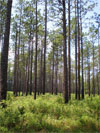
|
|
(02/10/2008) The Dogwood Alliance has released a report highlighting the damage done by paper pulp mills and their corporate customers to America's Mid-Atlantic Coastal Forests. The forests, which span from Delaware through the Carolinas to Georgia, are extremely rich in biodiversity; scientists have catalogued over two-thousand terrestrial species, including thirty-two endemic species. Probably the most famous endemic species is the Venus flytrap; this strange carnivorous plant is native to an area only 10 by 100 square miles in North Carolina. A study by WWF determined that both species richness and endemism is even higher for freshwater aquatic species.
[
Logging | United States]
Staples dumps Asia Pulp & Paper over its destruction of virgin rainforests
(02/08/2008) Office supply giant Staples Inc. dropped Asia Pulp & Paper Co. Ltd. (APP), one of the world's largest paper companies, as a supplier due to concerns over its environmental performance, reports Tom Wright of the Wall Street Journal.
[
Indonesia | Logging | Deforestation]
Biofuels are worsening global warming

|
|
(02/07/2008) Converting native ecosystems for production of biofuel feed stocks is worsening the greenhouse gas emissions they are intended to mitigate, reports a pair of studies published in the journal Science. The studies follow a series of reports that have linked ethanol and biodiesel production to increased carbon dioxide emissions, destruction of biodiverse forest and savanna habitats, and water and air pollution.
[
Biofuels | Deforestation]
First rainforest-for-carbon-credits deal becomes a reality
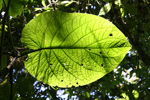
|
|
(02/07/2008) Villagers in Aceh, the Indonesian province that suffered through three decades of civil war and lost some 170,000 people to the 2004 Indian Ocean tsunami, could soon see $26 million in carbon credits for protecting rainforests from logging under a deal announced today between conservationists, carbon traders, and the Aceh government.
[
Avoided deforestation | Carbon finance | Conservation | Happy-upbeat environmental]
Carbon tax would make China greener and reduce warming risks
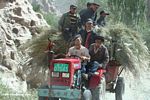
|
|
(02/07/2008) Driven by booming economic growth and rapid urbanization, China's carbon dioxide emissions are surging. At the same time, forecasts suggest climate change will have an immense impact on the country, with rising sea levels projected to swamp key industrial areas and diminished rainfall reducing agricultural output. Given this outlook, a new policy paper published in Science argues that China will need to embark on a cleaner path to growth, one that is less dependent on coal. The authors say that international assistance in the form of carbon funds could help persuade Chinese leadership to move towards more environmentally-friendly energy technologies.
[
China | Sustainability]
Madagascar's tortoises at high risk of extinction in the wild

|
|
(02/07/2008) Madagascar's rare and unique turtles and tortoises face high risk of extinction in the wild if conservation measures are not rapidly put into place, warned a group of scientists meeting to discuss the fate of Madagascar's most threatened reptiles. Gathering in Madagascar's capital city of Antananarivo, researchers from the Wildlife Conservation Society and other groups said that habitat destruction, illegal hunting, and the wildlife trade for the international pet market are the biggest threats to Madagascar's turtles and tortoises. Five of the nine species assessed by IUCN have been downgraded to critically endangered.
[
Endangered species | Herps | Madagascar]
France blocks controversial rainforest gold mine in French Guiana
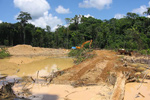
|
|
(02/06/2008) Environmentalists declared victory after the French government blocked approval of a controversial gold mine bordering the Kaw wetland, an ecologically rich site in French Guiana. The decision was handed down last week following an environmental assessment by the Ministry of Ecology and Sustainable Development [MEDAD] based on work by local scientists.
[
French Guiana | Happy-upbeat environmental]
New uakari monkey discovered in the Amazon rainforest
(02/05/2008) A previously unknown species of uakari monkey was discovered in the Brazilian Amazon, reports National Geographic News. The primate was identified after it was killed by Yanomamo Indians near the Brazil-Venezuela border.
[
Amazon | Species discovery]
Overfishing may hurt Amazon forest trees
(02/05/2008) Overfishing is reducing the effectiveness of seed dispersal by fish in the Brazilian Pantanal, reports Nature. The research suggests that fishing practices can affect forest health.
[
Amazon]
People spending less time outdoors
(02/04/2008) People worldwide are spending less time out in nature, according to research published this week in Proceedings of the National Academy of Science (PNAS). The development, warn the authors, could have implications for future conservation policy issues.
[
Environment]
Panamanian golden frog declared extinct by BBC Natural History crew
(02/04/2008) A national symbol of Panama has been declared extinct by BBC filmmakers. The crew was in Panama to film the unique frog for David Attenborough's most recent series on reptiles and amphibians, entitled Life in Cold Blood. The filmmakers achieved their objective and captured the golden frog on film, including rarely seen behavior.
[
Amphibians]
Climate system approaching 9 critical tipping points
(02/04/2008) Earth is approaching and may pass nine important climate tipping points this century, according to research published this week in Proceedings of the National Academy of Science (PNAS).
[
Climate change]
Papua New Guinea's Environment Minister says foreign firms attempted to bribe him
(02/04/2008) The Environment and Conservation minister of Papua New Guinea, Benny Allen, has stated that three different foreign firms attempted to bribe him.
[
Papua New Guinea]
Borneo's Sabah state will see $32B in investment
(02/04/2008) Malaysia put forth a $32.4 billion development plan for Sabah, a rainforest state on the island of Borneo, reports Reuters.
[
Malaysia]
World's largest elephant-shrew discovered in Tanzania
(02/01/2008) More than a quarter larger than all of its relations, the Grey-faced sengi (Rhynchocyon udzungwensis) was first discovered on a roll of film from camera traps set-up in the Udzungwa Mountains of Tanzania. The photos of this mysterious giant elephant-shrew were sent to expert Dr. Galen Rathbun, who has studied the sengi (or elephant-shrew) for over thirty years; after examining the photos he believed that the animal's unique coloring proved it was an unknown species.
[
Africa | Species Discovery]












